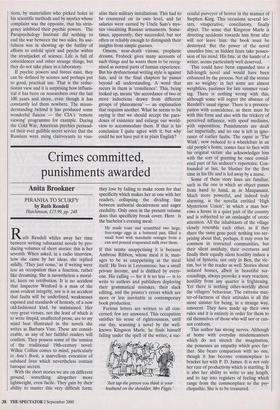Crimes committed, punishments awarded
Anita Brookner
PIRANHA TO SCURFY by Ruth Rendell Hutchinson, £15.99, pp. 248 Ruth Rendell whiles away her time between writing substantial novels by pro- ducing volumes of short stories: this is her seventh. When asked, in a radio interview, how she came by her ideas, she replied mildly, 'They just come,' as if writing were less an occupation than a function, rather like dreaming. She is nevertheless a moral- ist, keen on retribution. It is no accident that Inspector Wexford is a man of the most evident integrity, nor is it an accident that faults will be underlined, weaknesses exposed and standards of honesty, of a now old-fashioned kind, be maintained. Her very great virtues, not the least of which is to write limpid, unaffected prose, are to my mind best illustrated in the novels she writes as Barbara Vine. These are consid- erable, as any of her faithful readers will confirm. They possess some of the tension of the traditional 19th-century novel: Wilkie Collins comes to mind, particularly in Asta's Book, a marvellous evocation of subdued lives which nevertheless contain baroque secrets.
With the short stories we are on different ground, something altogether more lightweight, even facile. They gain by their ability to master this very difficult form; they lose by failing to make room for that specificity which makes her at one with her readers, collapsing the dividing line between authorial decisiveness and eager credulity. Only once in the present volume does that specificity break cover. Here is the bachelor's evening meal: He made toast and scrambled two large, free-range eggs in a buttered pan, filled a small bowl with mandarin oranges from a can and poured evaporated milk over them.
If this seems unappetising it is because Ambrose Ribbon, whose meal it is, man- ages to be as unappetising as the meal itself. He lives in Leytonstone, has a small private income, and is disliked by every- one. His calling — for it is no less — is to write to authors and publishers deploring their grammatical mistakes, their slack editing, and the printer's errors which are more or less inevitable in contemporary book production.
Furious letters are written to all con- cerned; few are answered. This occupation satisfies his sense of righteousness, until one day, scanning a novel by the well- known Kingston Marle, he finds himself falling under the spell of the writer, a suc- `Just tap the person you think is your husband on the shoulder, Mrs Figgis.' cessful purveyor of horror in the manner of Stephen King. This occasions several let- ters, vituperative, conciliatory, finally abject. The sense that Kingston Marle is directing accidents towards him from afar will not leave him: the book must be destroyed. But the power of the novel unsettles him, as hidden fears take posses- sion of his mind. His fate, at the hands of a writer, seems particularly well deserved.
This could have been expanded into a full-length novel and would have been enhanced by the process. Not all the stories are so weighty: in fact some are almost weightless, pastimes for late summer read- ing. There is nothing wrong with this, although some will regret the absence of Rendell's usual rigour. There is a preoccu- pation with coincidence, as there must be with this form and also with the trickery of perceived influence, with spoof mediums, with superstition. Punishments are dealt out impartially, and no one is left in igno- rance of earlier faults. The rapist in 'The Wink', now reduced to a wheelchair in an old people's home, comes face to face with his original victim: she acknowledges him with the sort of greeting he once consid- ered part of his seducer's repertoire. Con- founded at last, he blushes for the first time in his life and is led away by a nurse.
Some of these story lines are familiar, such as the one in which an object passes from hand to hand, as in Maupassant. Much more powerful, and indeed truly alarming, is the novella entitled 'High Mysterious Union', in which a man bor- rows a house in a quiet part of the country and is subjected to an onslaught of erotic attention. All the inhabitants of the village closely resemble each other, as if they share the same gene pool: nothing too sur- prising about that, perhaps, it may even be common in restricted communities, but their silent assiduity, their overtures and finally their equally silent hostility induce a kind of hysteria, not only in Ben, the vic- tim, but in the reader as well. Stories about isolated houses, albeit in beautiful sur- roundings, always provoke a wary reaction; hostility from any quarter is frightening. Yet there is nothing other-worldly about the villagers' behaviour. The extreme mat- ter-of-factness of their attitudes is all the more sinister for being, in a strange way, innocent. They have made up their own rules and it is entirely in order for them to rid themselves of those who will not or can- not conform.
This author has strong nerves. Although at home with everyday misdemeanours which do not stretch the imagination, she possesses an empathy which goes fur- ther. She bears comparison with no one, though it has become commonplace to bracket her with P. D. James. It is not only her rate of productivity which is startling. It is also her ability to write to any length, and to tap into registers of feeling which range from the commonplace to the psy- chopathic. She is to be treasured.


























































 Previous page
Previous page